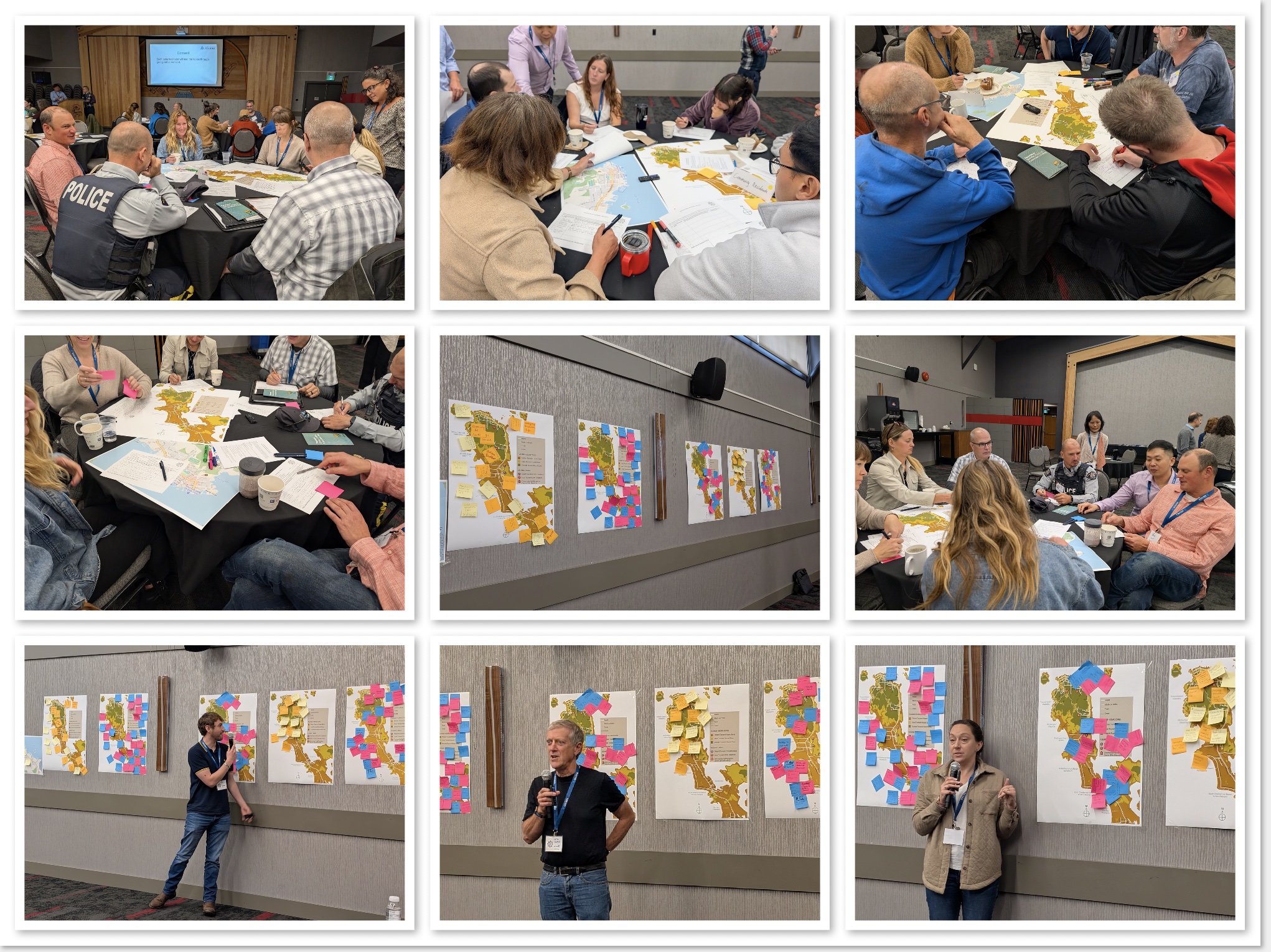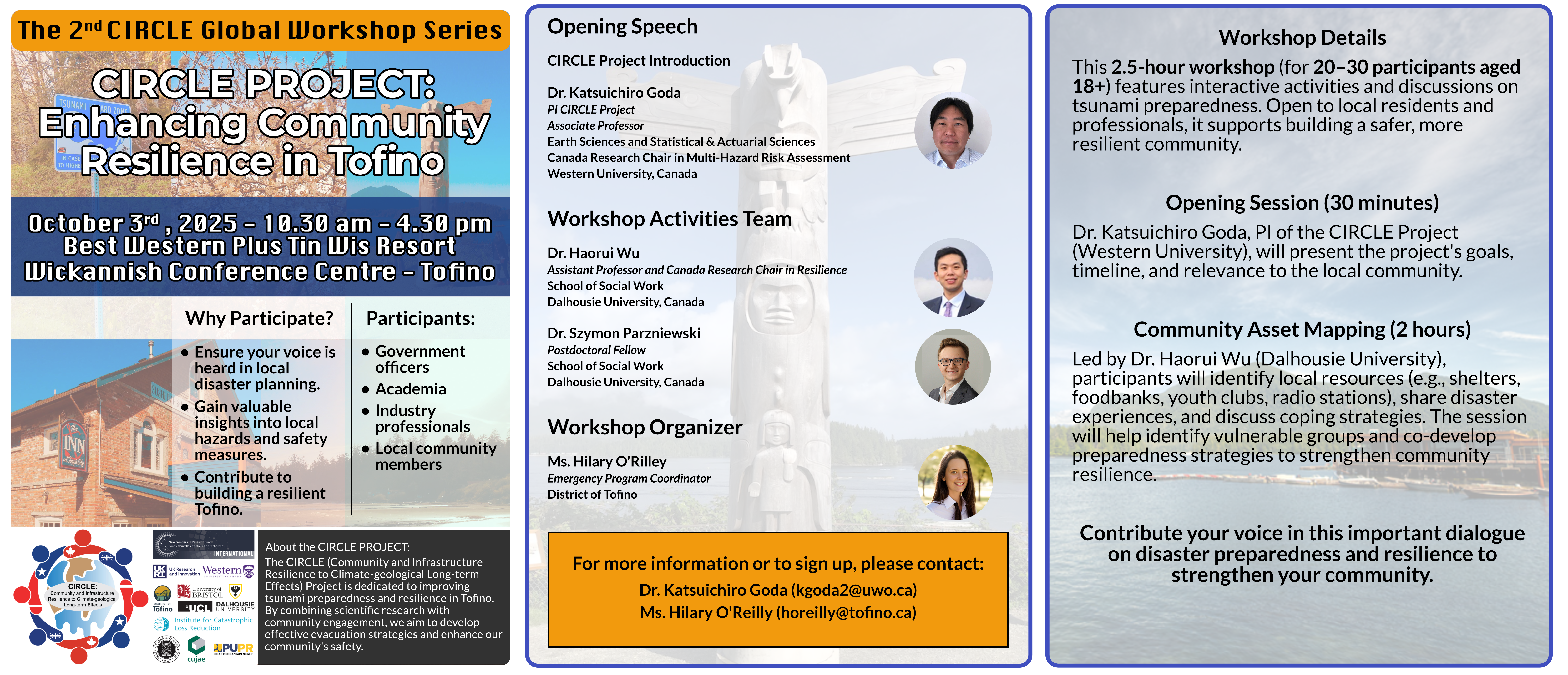2025 Tofino Workshop

In Tofino, a coastal town on Vancouver Island, the workshop will address disaster resilience challenges faced by communities along the Pacific coast, particularly in relation to climate change and the risks of earthquakes and tsunamis. This region is highly vulnerable to seismic activity, and the local community has been actively engaged in efforts to understand and mitigate these hazards. The workshop will bring together local government officials, community organizations, environmental scientists, and community members to co-develop resilience strategies tailored to the unique needs of the Tofino area.
Participants will engage in collaborative sessions to:
- Map seismic risks and assess vulnerabilities to coastal flooding and tsunamis
- Develop preparedness strategies that account for local resources and community knowledge
- Foster inclusive recovery planning that ensures all sectors of the community are supported post-disaster
Join us to help co-design community-driven, resilient futures that protect Tofino's population and its iconic coastal environment.
Flyer
Workshop Agenda
| Time | Session |
|---|---|
| 09:30 – 10:00 am | Registration and Consent Signing |
| 10:00 – 10:30 am | Opening Ceremony • Welcome by Indigenous Elder • Opening remarks by Katsu (PI, CIRCLE Project) |
| 10:30 – 12:00 am | Community Asset Mapping (CAM) Activity |
| 12:00 – 12:30 pm | Lunch + Lunchtime Presentation |
| 12:30 – 01:30 pm | Science Presentation and Q & A |
| 01:00 – 02:00 pm | Break |
| 02:00 – 04:00 pm | CIRCLE Meeting • Research collaboration discussion |
| 04:00 pm - onward | Visit evacuation site and beach |
Community Assets Mapping Activity
Participants will collaboratively map local resources such as:
Social networks (e.g., youth clubs, community groups)
Other assets (e.g., local radio stations)
Additionally, participants will be invited to share personal experiences with past disasters and coping strategies. This will help the CIRCLE team identify vulnerable populations and areas needing support.
Note:
The hike to visit the tsunami shelter will proceed if the weather permits. Alternatively, the visit is scheduled for the day after the workshop (October 4th), before we leave Tofino.
Workshop Participant Information Form (Including Accessibility & Dietary Requirements)
Please complete the Workshop Participant Information Form (including accessibility and dietary needs) by clicking the link below.
- Deadline: September 29 at 11:45 PM
Your timely response helps us ensure a comfortable and inclusive experience for all participants. Thank you!
Tofino Workshop Participant Information Form
Tofino Community Asset Mapping Workshop
Tofino is a small district on Vancouver Island, off Canada’s west coast. Known for its stunning natural scenery—including lakes, beaches, and rainforests—Tofino attracts many tourists each year. Despite its beauty, this coastal town, with a population of just over 2,000 people, faces significant seismic and tsunami risks due to its proximity to the Cascadia Subduction Zone. A potential Cascadia megathrust earthquake could generate massive tsunamis, posing an imminent threat to Tofino and other Pacific coast communities.
On October 3, 2025, the CIRCLE Project hosted a Community Asset Mapping (CAM) Workshop in Tofino. The workshop began with a presentation by Dr. Katsuichiro Goda from Western University introducing the CIRCLE Project and its collaborators, followed by CAM activities led by Dr. Haorui Wu and Dr. Szymon Parzniewski (the Dalhousie University). Participants were divided into six groups and enthusiastically engaged in the mapping exercises. By the end of the session, the walls were adorned with six colorful maps, and each group shared key community assets essential for preparing for earthquake and tsunami hazards. The photos captured the energy and enthusiasm of the participants, reflecting how engaged and lively the workshop was.
 During lunch, Dr. Katsuichiro Goda and Dr. Mohammad Reza Najafi (Western University) presented on earthquakes and tsunamis, including Tofino’s specific exposure and the influence of factors such as future relative sea-level rise. These presentations provided participants with a clear understanding of the risks facing their community. By the end of the day, attendees left the workshop better informed and more confident in taking preparedness measures to protect their community.
During lunch, Dr. Katsuichiro Goda and Dr. Mohammad Reza Najafi (Western University) presented on earthquakes and tsunamis, including Tofino’s specific exposure and the influence of factors such as future relative sea-level rise. These presentations provided participants with a clear understanding of the risks facing their community. By the end of the day, attendees left the workshop better informed and more confident in taking preparedness measures to protect their community.

Participants showed great enthusiasm throughout the CAM activities, actively engaging in discussions and eagerly sharing their insights. The walls were covered with colorful maps displaying important community infrastructure and assets, creating a vibrant and collaborative atmosphere. Each group selected one representative to give a brief presentation summarizing the results of their discussion, which sparked further exchange of ideas among participants.

This workshop also marked a milestone for CIRCLE Project collaborators from Canada, Cuba, and Indonesia, who met in person for the first time. The gathering provided a valuable opportunity to discuss potential project collaborations and plan the next workshop in a relaxed setting.
Acknowledgments
- Special thanks to Hilary O'Riley for her dedication and tremendous effort in ensuring the workshop ran smoothly. Despite her busy schedule safeguarding the Tofino community, she gave 100% to the success of this event.
- Thank you to Dr. Haorui Wu and Dr. Szymon Parzniewski (Dalhousie University) for preparing excellent materials and leading the CAM activities, and to the Tofino community for their enthusiastic participation.
- We are grateful to our international collaborators—Prof. Vivian Elena, Dr. Katia Luis Garcia, and Prof. Cordova (CUJAE, Cuba), and Dr. (cand.) Gusti Ayu Ketut Surtiari (Indonesian Collaborator)—for traveling to Tofino to contribute to the workshop and engaging in CIRCLE Project discussions.
- Thank you to Dr. Katsuichiro Goda and Dr. Mohammad Reza Najafi (Western University) for providing scientific materials, funding, and other essential resources for the workshop.
- We would also like to extend our gratitude to the venue and its staff for providing a welcoming and well-equipped space for the workshop. Thanks are due to all individuals who contributed—whether through planning, organizing, or supporting the event behind the scenes—whose efforts were essential to making the workshop a success.
We hope the outcomes of this workshop will help strengthen Tofino’s preparedness and resilience against future earthquake and tsunami threats.


